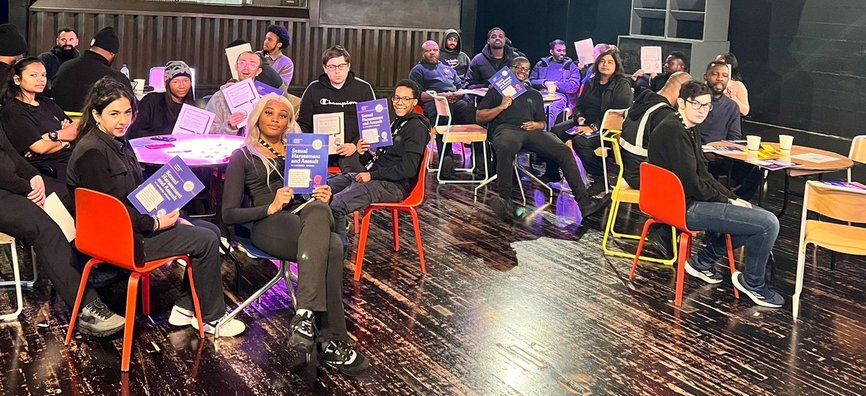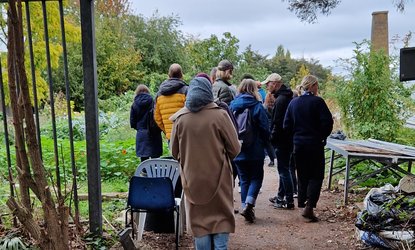We carry out an annual survey of Trustees and staff to help us track progress on diversity, equity and inclusion within Esmée. We also asked staff a question on salary to help us understand our gender, ethnicity and disability pay gaps.
We first surveyed Trustees and staff in 2020 and have since repeated the survey every year. The survey is anonymous and the questions focus on a number of characteristics including ethnicity, gender, disability, age, and sexual orientation, reflecting the categories in the DEI Data Standard.
Since 2023, we have asked questions around socioeconomic background and also started asking staff about salary.
The data
All 55 members of staff and Trustees (at the time of the survey) took part in the 2024 survey (compared to 49 people in 2023, where the results were incomplete due to 8 people not responding).
For all questions, respondents were able to choose 'Prefer not to say'.
Ethnicity
In 2024, 71% of Esmée staff and Trustees identified as White*, 29% identified as a category that wasn't White. For comparison, the UK as a whole is 82% White (see Ethnicity Facts and Figures).
Our Senior Management Team (SMT), Trustees and Funding team are the least diverse. The grouping for all other staff is the most diverse with 50% identifying as White and 50% identifying as another category.
The following chart and table shows the ethnicity breakdown of our Trustees, SMT, Funding Team and all our other staff in 2024.
* Respondents were able to choose from a number of White ethnic groups (including White - other, or say an ethnicity not specified in the list). For these results, we have chosen not to publish more detailed data.
| Ethnicity distribution (2023 figures in brackets) | |
|---|---|
| Trustees |
White British/other White ethnic background: 75% (50%) Asian/Asian British: 17% (8%) Mixed – Multiple ethnic background 8% (0%) Did not respond: 0% (42%) |
| Senior Management Team |
White British/other White ethnic background: 86% (65%) Black/African/Caribbean/Black British - 14% (17%) Did not respond: 0% (17%) |
| Manages funding (grants or social investments) |
White British/other White ethnic background: 75% (73%) Black/African/Caribbean/Black British/other Black ethnic background: 10% (7%) Mixed – Multiple ethnic background: 15% (7%) Did not respond: 0% (13%) |
| All other staff |
White British/other White ethnic background: 50% (44%) Asian/Asian British: 12% (13%) Black/African/Caribbean/Black British/other Black ethnic background: 19% (19%) Mixed - Multiple ethnic background: 19% (21%) |
Gender
As with previous years, we have more people identifying as female (66%) than male (34%). None of our people identified as another gender. The biggest difference is for our Funding team and all other staff categories where 75% identified as female.
The following chart and table shows the gender breakdown of our Trustees, Senior Management Team (SMT), Funding Team and all our other staff in 2024.
| Gender distribution (2023 figures in brackets) | |
|---|---|
| Trustees | Female: 58% (25%), Male: 42% (33%), Did not respond: 0% (42%) |
|
Senior Management Team |
Female: 57% (33%), Male: 43% (50%), Did not respond: 0% (17%) |
|
Manages funding (grants or social investments) |
Female: 75% (60%), Male: 25% (27%), Did not respond: 0% (13%) |
| All other staff | Female: 75% (75%), Male: 25% (25%) |
Disability
In total, 29% of our people answered 'yes' to a question about whether the are disabled or have a long-term health condition, 71% said they are not disabled or have a long-term health condition.
Esmée's gender, ethnicity and disability pay gap
The gender pay gap is the difference in pay between men and women. The ethnicity pay gap is the difference in pay between people from communities experiencing racial inequity and people identifying as White. The disability pay gap is the difference in pay between people who are disabled or have a health condition and people who don't.
As part of our survey and used this to calculate our gender, ethnicity, and disability hourly pay gap. Our overall pay gap for ethnicity, gender and disability are below.
This has been calculated based on the difference between average (median) hourly earnings, shown by the percentage a group is being paid more than the other, so for the gender pay gap, this is the % men are being paid more than women. We've also shown data for the 'mean' pay gap.
We plan to share more detail alongside our reflections and plans to reduce the pay gap shortly.
| Median pay gap (the UK national pay gap is in brackets) | Mean pay gap | |
|---|---|---|
| Gender | 17.4% (7.7%) | 21.1% |
| Ethnicity | 17.8% (16.8%) | 18.9% |
| Disability | 7.7% (13.8%) | 4.6% |
Age, Sexual Orientation, and Socioeconomic background
- Age:
Amongst our Trustees, half said they were 55-64 years old, with others saying they were 45-54 years old (25%), 65 or over (17%), or 35-44 years old (8%). There is a relatively even distribution of our staff across the age groups between 25 and 64 years old.
- Sexual orientation
Overall, 11% identified as LGBTQ+ and 89% identified as heterosexual.
- Socioeconomic background
We asked two questions designed to measure socioeconomic background suggested by the Social Mobility Commission. These related to the type of school they attended and the profession of people's parents.
- 50% of Trustees and 16% of staff indicated that they attended a fee paying school without a bursary. By comparison, 7.5% of individuals in the wider population attended a fee paying school without a bursary.
- 92% of Trustees and 74% of staff indicated that their parents held either modern or traditional professional jobs. This compares to 47% of the wider population.





